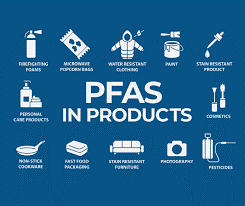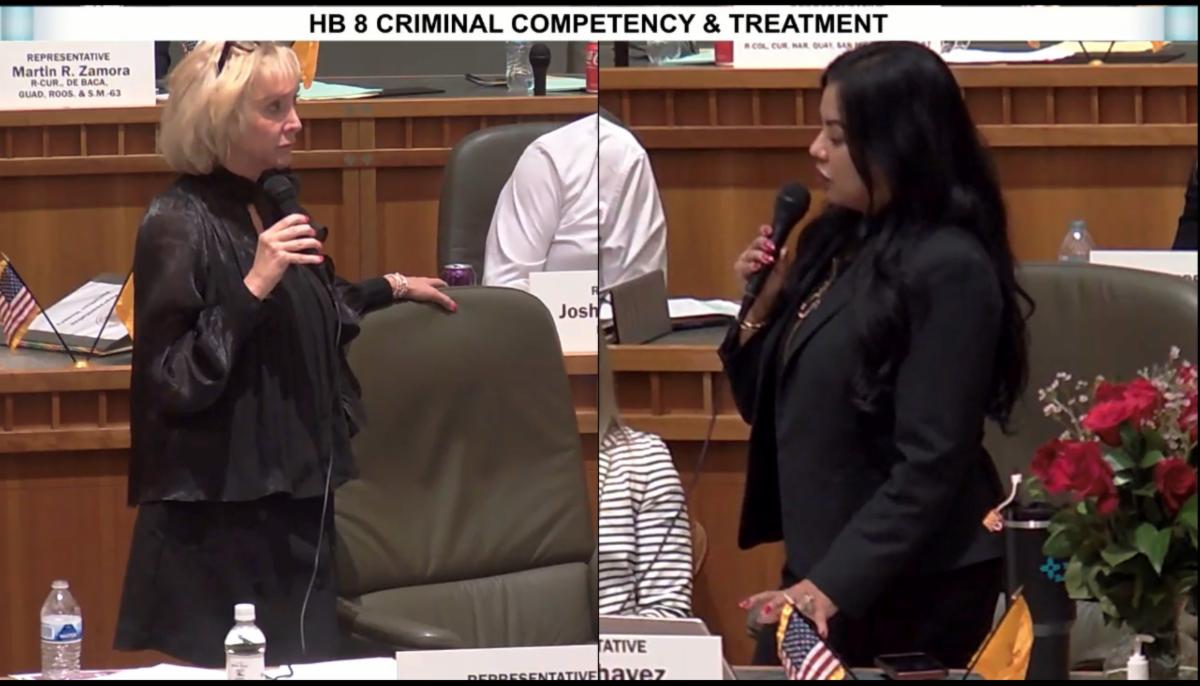HOUSE PASSES PUBLIC SAFETY PACKAGE 48-20

House Bill 8, the “public safety package,” gained House approval 48-20 after three hours of debate and attempts to amend the bill. To quickly recap, HB 8 revamps criminal competency statutes, creates a crime for converting weapons to fully automatic, makes a shooting threat the same level of crime as a bomb threat, enhances sentences by up to three years for trafficking fentanyl, allows blood testing for DWI involving drugs (not cannabis) and imposes stiffer penalties for auto theft.
Good, but More Needs to be Done
While we believe that all these are good things, we think there are many important steps that need to be taken to make this a really complete crime-fighting proposal that genuinely responds to the public outcry for getting tough on criminals and making our communities a lot safer. Let’s not forget that our violent crime rate is double the national average, and we have the second-highest number of violent crimes in the nation.
The fact that we have a public safety bill at all is because the governor called a special session and has shined a bright light on making our communities safer as soon as possible. So, good for you, governor. That should be everyone’s common goal, and it takes an “all-of-the-above” approach – tougher penalties for egregious crimes, rebuilding the behavioral health system and slamming the revolving door shut. The session is not quite half over – there’s plenty of time to add critical but so far missing pieces.
Here are the top actions that we are advocating for:
- Juvenile justice reform – serious violent crimes committed by youthful offenders is the fastest-growing category in our communities. We must find a way to take violent offenders off our streets. Murder is murder regardless of age. It’s serious, and we need to treat it seriously. In Albuquerque, there are 1,048 cases of juvenile crime pending, 890 involving firearms. There’s been a 57% increase in juvenile crime, and 33 offenders are charged with murder.
- Racketeering – the scope of crimes that can be prosecuted using racketeering laws in New Mexico is very narrow. We need to add many additional crimes to break human trafficking, drug dealing and other organized crimes.
- Felons using firearms – substantially increase sentences for convicted felons who commit subsequent crimes using a firearm.
- Increased penalty for drug trafficking resulting in death – impose second-degree felony penalties for this crime and first-degree sentences if the death of a minor is committed.
- Pretrial detention – require that felons who have committed a subsequent violent crime be held in custody pending trial and not be released back into the community.
- Clarify the definition of “harmful to self or harmful to others” so judges can keep violent offenders in custody. Currently, the definition is vague, and too often judges release bad guys back into the community.
Amendments Offered on the House Floor
Rep. Andrea Reeb (R-Chavez, Curry & Roosevelt) was the district attorney of Curry County and a longtime prosecutor. In other words, she knows of what she speaks. Her biggest concern is the rapid increase in serious, violent juvenile crime. Her belief is that failure to address this issue will result in the Legislature needing to come back again and again until this is fixed.
Consequently, she offered two floor substitutes (amendments) to HB 8. The first deleted two elements of HB 8 (shooting threat and gun conversion devices because she thinks they need clarification) and added items including changes to the delinquency act (juvenile crimes) to broaden the number of crimes in which a serious youthful offender could be charged as an adult and lower the age from 15 to 14, toughen sentences for felons using a firearm, and establish a first-degree felony for distributing fentanyl to a minor. This substitute was tabled on a party line vote of 42-26, D’s in favor of tabling, R’s opposed.
She then made another attempt at a compromise. She left the current HB 8 as-is and simply added the provisions of the delinquency code proposed above. That was also tabled on a nearly partisan vote of 41-27. Rep. Charlotte Little (D-Bernalillo) crossed party lines.
Finally, after a full three hours of debate, HB 8 passed the House on a vote of 48-20. Nine Republicans, including Reeb and Minority Leader Gail Armstrong (R-Catron, Sierra, Socorro & Valencia) voted in favor. Two Democrats, Matthew McQueen (D-Sandoval and Santa Fe) and Angelica Rubio (D-Doña Ana) voted no. Both representatives were opposed to some provisions in HB 8 and objected to the six bills ultimately being bundled together.
Whither from Here?
The session is not quite half over. There’s plenty of time to modify HB 8 in the Senate or to move separate pieces of legislation. In either case, it’s clear more needs to be done. Reeb’s HB 134, which deals with juvenile crime as she proposed in the floor amendments, is apparently finally going to be set for hearing in the House Consumer and Public Affairs Committee. This will be a crucial litmus test on whether moving additional public safety measures forward can happen in the House. Meanwhile, we’ll also be advocating for Senate bills that deal with many of these subjects. While we appreciate HB 8’s many good features, we also can’t let that be the last word in fighting crime this session.
HOUSE COMMITTEE TABLES PROPOSED
ELECTED STATE BOARD OF EDUCATION

Earlier this week, we reported on Senate Joint Resolution 3, a mirror image of House Joint Resolution 4, which was considered today by the House Government, Elections and Indian Affairs committee. Both propose a constitutional amendment to re-establish a state board of education, which was dismantled by voters in 2013 because public schools were not producing student success (and they’re still not). That’s why the Chamber and others say that the governance structure isn’t the problem – it’s the lack of focus on student success. Today HJR 4, sponsored by Rep. Alan Martinez (R-Sandoval), was tabled by the committee on a 5-3 party-line vote, D’s for tabling, R’s opposed.
Terri Cole, president and CEO of the Chamber, offered these comments to the committee:
“We respectfully oppose this legislation because it would inject more politics into public education, and that’s the last thing we need. Putting a large, partially elected group of people in charge of our state’s education system is a recipe for more division and acrimony. Local school boards across America are under fire for governance issues – many local boards are hotbeds of political chaos – and they routinely lose focus on student needs and outcomes. Why would we want a similar situation at the state level?
“Please recall, New Mexico once put an elected body in charge of utility regulation in our state – and for many of the same reasons we’re talking about a state school board today, we ended up with a daily cocktail of dysfunction and poor decision-making. And, rightly so, we retreated from that model.
“We also want to emphasize that this resolution does NOT adequately protect public charter schools. It would eliminate the current state charter school authorizer, which is performing very well.
“Finally, the number of adult decision-makers is not driving students’ unacceptably low academic performance. This resolution is not going to fix what’s broken. Let’s not advance a so-called solution that hasn’t worked before and won’t again.”
Also appearing in opposition were the Department of Public Education, the Public Education Commission (responsible for state charter schools), Excellent Schools of New Mexico and NewMexicoKidsCan. The Public Education Commission by all accounts has been doing a good job in overseeing and encouraging charter schools. HJR 4 would wipe out this commission and place charter schools under the state board of education. The concern is that attention to charter schools would be diluted at best.
Amanda Aragon of NewMexicoKidsCan pointed out that the 49 other states above us in educational achievement all have different forms of school governance. So, it can’t be the form of governance that matters. Rather, the problem is the lack of focus on instruction (math and reading, particularly). The Public Education Department (PED) points out that public education also includes early childhood learning and higher education, all sitting at the governor’s Cabinet table. Removing PED from that structure could reduce collaboration, especially if a state board of education takes off in a different direction than the governor. The governor is the one point of coordination and accountability.
We understand the frustration of public education failure. We’re just as frustrated. Billions of dollars and half the state’s general fund budget with huge increases in spending over the last five years with minimal results. We get it. But trying to go forward with a back-to-the-future answer just doesn’t work.
The mirror SJR 3 is in Senate Rules on Monday morning. We will be there and will let you know what happens.
LEADERSHIP MATTERS: NEW STANDARDS
FOR SCHOOL PRINCIPAL TRAINING, DEVELOPMENT

This morning, the House Government, Elections and Indian Affairs Committee gave a unanimous “do-pass” recommendation to House Bill 157, sponsored by Reps. Joy Garratt (D-Bernalillo), Brian Baca (R-Valencia) and Raymundo Lara (D-Doña Ana). The goal is to raise the standards for principal training and development through mentoring and other support. Terri Cole, president and CEO of the Greater Albuquerque Chamber of Commerce, provided the following testimony:
“I’m here today to support HB 157 because to improve education in New Mexico, it’s helpful to think about turning things around one school at a time, which, at its core, is a leadership challenge. There are no documented instances nationally of a school turning around its academic performance in the absence of a dynamic, effective leader at the helm. Stronger, better-prepared principals are essential to driving change.
“The final few pages of this bill significantly raise the standards for how we train principals in New Mexico, which we’ve been urging the Legislature to adopt for several years. Things like:
• Rigorous on-the-job training
• Aggressive recruitment of top teaching talent into school leadership training, and
• Improved tracking of graduates from principal prep programs
“We urge your support of this bill because better-prepared leaders in our schools will build stronger students. Thank you.”
The goal is to achieve nationally recognized best practices because the principal must lead a culture of learning. With the right training and support, there will be a consistency of leadership. Turnover among principals is very high due to a number of factors, including lack of preparation for leadership and local support.
The Chamber has long advocated for exactly this kind of change. Through a grant from the Thornburg Foundation and Los Alamos Laboratory Foundation, the Chamber engaged Education Research and Development, a nationally recognized group of experts, to prepare a report on school leadership, and many of those recommendations are included in HB 157. The report leads off with this statement:
“I can tell you a good principal is worth their weight in gold. They make everything work. And when you have a principal that is not good, teachers leave.”
– Mimi Stewart, Senate President Pro Tempore
The report underscores the importance of principals (click here to access the entire report):
Principals play a critical role in school improvement and student success. Studies have shown that strong school leaders are second only to teachers as a strategy for improving student achievement.
We couldn’t be more pleased that HB 157 received a ringing endorsement and now heads to the House floor. We’ll keep you posted.
HOUSE ENERGY STOPS CONFLICTING,
OVERBROAD CHEMICAL BAN IN ITS TRACKS

Can you say per- and poly- fluoroalkyl three times fast? Heck, can you say it once? How about PFAS – that’s better. These are “forever” chemicals used in thousands of consumer products and as an enhancer for oil recovery. House Bill 222 seeks to ban the use of PFAS in enhanced oil recovery, despite the fact that there is little scientific evidence of that use causing harm to human health or the environment. The House Energy and Natural Resources Committee rolled the bill over this morning. Whether further amendments can revive this bill is unknown. J.D. Bullington stood in opposition on behalf of the Chamber:
“Mr. Chair and members of the committee. I’m J.D. Bullington appearing on behalf of the Greater Albuquerque Chamber of Commerce in opposition to HB 222. The bottom line in our view is that there are just too many uncertainties to make this legislation viable.
“First, the impact on production in our state is unknown. No other state has done this, and we’re thinking it’s not good to be a first adopter. Secondly, there’s legal jeopardy, well stated by the attorney general. Third, there’s a rulemaking going on right now to address this subject that would be completely derailed if this bill passes.
“Perhaps, the statement in the Fiscal Impact Report by Energy, Minerals and Natural Resources says it all, ‘…too broad, not connected to science-based human health or environmental concerns and negatively affects oil and gas recovery.’ We ask for a ‘no’ vote on HB 222.”
Also in opposition are the New Mexico Oil and Gas Association and the New Mexico Chamber of Commerce. In support are environmental organizations, the Sierra Club, the Center for Biological Diversity and the New Energy Economy (the chair allowed only three people on each side of the issue to testify).
Supporters claim that PFAS are harmful to human and animal life, that the effects of PFAS’ use in the oil and gas industry is unknown but oil and gas uses billions of gallons of water unlike any other industry, and so banning their use in oil and gas recovery makes sense, as well as forcing more disclosure.
According to the EPA’s website, “There are thousands of PFAS chemicals, and they are found in many different consumer, commercial and industrial products. This makes it challenging to study and assess the potential human health and environmental risks.” The EPA goes on to discuss what is not known and what requires more scientific study, saying EPA’s researchers and partners across the country are working hard to answer critical questions about PFAS:
- How to better and more efficiently detect and measure PFAS in our air, water, soil and fish and wildlife
- How much people are exposed to PFAS
- How harmful PFAS are to people and the environment
- How to remove PFAS from drinking water
- And how to manage and dispose of PFAS.
The short translation: We don’t know a whole bunch of stuff. The New Mexico Legislature rightfully prides itself, quite appropriately, on crafting legislation that is “evidence-based.” House Bill 222 is far, far away from evidence-based. Despite claims from proponents that California and Colorado already ban PFAS, their laws are focused on the whole range of consumer products – clothing, cooking utensils, carpets, makeup, etc. – not just one industry (and both states do have oil and gas production, though in decline).
The largest known PFAS presence in New Mexico groundwater is near Holloman AFB in Clovis. This is not the result of enhanced oil recovery but rather from the use of fire suppressants. PFAS are particularly resistant to heat, oil, grease and water, making an ideal suppressant. The Water Quality Control Commission has rulemaking ongoing that will deal with many of the issues raised in HB 222. This important rulemaking, based on a wide range of expert testimony, would be completely upended with passage of this bill.
Too much uncertainty, too many unknowns, too many complications – it’s not a formula for success. We hope this bill does not come back to life.
MORE HEALTH CARE COMPACTS CLOSER TO LAW

This morning, the House Judiciary Committee heard testimony on three health-care provider compacts sponsored by Rep. Elizabeth “Liz” Thomson (D-Bernalillo). The Chamber supports these as well as their counterparts moving through the Legislature this session as a means to increasing access for New Mexicans to medical providers. The Judiciary Committee passed one compact bill unanimously and appears poised to do the same with the other two next week when their amendments are folded into committee substitutes for “clean bills to send to the House floor.”
As we have written before, the compacts allow providers who are in other states to move here and practice, or provide telehealth services from another state, without having to jump through the hoops of applying for, paying for, and waiting for a license to practice in New Mexico. The goal in joining these compacts and providing reciprocity is to make more providers available to New Mexicans for everything from care to education to second opinions.
As an example, the audiology and speech-language pathologist compact has 34 states and U.S. Virgin Islands as members. That promises to exponentially increase access to care for New Mexicans.
All three bills – House Bills 79, 81 and 82 – previously sailed through the House Health and Human Services Committee with unanimous 8–0 votes. Today there was zero opposition testimony in person, online or from the committee.
House Bill 82, regarding physical therapists, passed on a 9-0 vote and heads to the House floor. House Bill 79, regarding audiology and speech-language pathologists, and House Bill 81, regarding occupational therapists, had amendments approved today to clean up language and incorporate background checks that are required for compliance with the multi-state compacts. Judiciary Chair Rep. Christine Chandler (D-Los Alamos, Sandoval & Santa Fe) said she wanted clean bills to send to the House floor and preferred committee substitutes to several pieces of paper; Thomson agreed.
J.D. Bullington testified in support of the three bills for the Chamber. Here are the highlights:
- “It’s no secret we have a dire shortage of all medical professionals in New Mexico. Making it easier for licensed providers in other states to treat New Mexicans – be it in person or in a telehealth setting – is a real way to begin to get more New Mexicans the care they need, and address the lack of providers here while at the same time encouraging them to practice in, perhaps even move to, our state.”
- “Anyone who has had an injury or a surgery knows how essential high-quality physical therapy is to a full recovery, and how hard it is to get an appointment when you really need it. HB 82 is an important part of the solution.”
- “This bill will allow licensed medical professionals from all states in the compact to practice in New Mexico without jumping through more licensing hoops. HB 81 targets occupational therapists, which will help everyone from children with developmental delays and adults with conditions that make daily activities more difficult, to veterans. And there are 31 states in this compact, including Arizona and Colorado, so it has real potential to increase care options for New Mexicans.”
Thomson, a retired physical therapist, shared that our state is short 600 physical therapists and the University of New Mexico graduates 31 or 32 a year. “At that rate, if no one retires or leaves the state, we’ll catch up in 20 years.” A Santa Fe physical therapist testified that at her six-provider practice it “takes months or years to hire” someone, and not being in the compact “is a deal-breaker” for many applicants. They now have a three-month waiting period for an appointment and are not accepting new patients.
Joining the Chamber in support of one or all the bills this morning were:
- The Department of Defense, which highlighted the military members and their spouses who would be able to provide care to New Mexicans under the compacts. Thomson said without the compacts, DOD could pull or reject additional missions in our state.
- Think New Mexico, which has this and the other compacts being introduced as the single most impactful thing the Legislature can do this session to address the shortage of health care professionals in our state.
- A representative of the physical therapy compact
- A representative of the occupational therapy compact
- The New Mexico Speech and Hearing Association
- The New Mexico Military Base Planning Commission
- The New Mexico Conference of Catholic Bishops
- The University of New Mexico
- The Occupational Therapy Association
- The National Alliance on Mental Illness
- Voices for Children
- Los Alamos County
- Desert States Physical Therapy Network
- The New Mexico Chapter of the American Physical Therapy Association
- The League of Women Voters
- AARP
- And therapists in the respective fields mentioned in the bills.
- Currently, New Mexico is part of one health care compact – for nurses. Think New Mexico says by comparison, Colorado is part of all 10 that are in place, Utah is in nine, Oklahoma is in eight, Arizona is in six and Texas is in five.
It’s also important to point out that the state gives up no oversight in any of these compacts, according to the bills’ analyses, and preserves “the regulatory authority … to protect public health and safety through the current system of state licensure.” Chandler pragmatically asked how we’ll know if the compacts actually deliver on their promise of more providers, and Thomson and her expert witnesses shared compact licenses will be a good indicator, as will the number of graduates who get N.M. licenses.
Thomson explained the compacts are one piece of a more comprehensive answer that includes increasing Medicaid reimbursements, adopting incentives such as tuition and housing assistance, and other measures, and she said if anyone has a proposal to help attract and keep medical professionals she’d “be happy to carry that bill.”
Additional compacts will be heard this session (Thomson said she believes a dozen are in the works), and the Chamber will follow HB 79, 81, 82 and all the others with the goal of getting them signed and into law. Hats off to Fred Nathan from Think New Mexico. He’s provided some terrific leadership on these health-care compact bills, and we are very pleased to follow his lead. We’ll keep you informed along the way.
HIDING EVICTION RECORDS UNFORTUNATELY ADVANCES

House Bill 253, Sealing of Certain Court Records, is well-intentioned legislation. Rep. Andrea Romero (D-Santa Fe) presented her bill this morning before the House Consumer and Public Affairs Committee. Her bill seeks to increase housing stability for all New Mexicans by shielding renters from their own eviction court records. The bill passed the committee on a 3-2 vote and heads next to the House Judiciary Committee.
Enrique C. Knell was there on behalf of the Chamber to respectfully oppose the legislation, saying, “There are always two sides to a story, and one important side is that landlords have bills to pay, too. Landlords are in the service business. It’s an expensive business, requiring a large capital commitment and the expenses associated with ongoing maintenance and repair. Eviction is not a simple process – Landlords don’t want to go through the hassle of eviction if they can avoid it.”
Knell also made the point that a great number of landlords aren’t giant, faceless, corporate conglomerates. Rather, they are small business people striving to make ends meet just like most New Mexicans.
Several organizations lined up with the Chamber to oppose HB 253, including the New Mexico Association of Realtors and the Apartment Association of New Mexico.
Rep. John Block (R-Otero) noted that the legislation made no distinction between reasons for eviction, from non-payment to serious property damage or even running a meth lab. Any eviction for any reason would be shielded after three years.
VETERANS PROPERTY-TAX BENEFITS SAIL THROUGH HOUSE

House Bill 47, sponsored by Rep. Art De La Cruz (D-Bernalillo) and Minority Whip Alan Martinez (R-Sandoval), was sent to the Senate on a unanimous 62-0 vote (a few members recused themselves because their households will benefit). The bill enacts two veteran property tax exemption changes that New Mexicans voted on as constitutional amendments in the November 2024 general election. The first change is increasing the property tax exemption from $4,000 to $10,000. The second change expands the disabled veteran property tax exemption to include a proportionate exemption reflecting a veteran’s partial disability. The current exemption only provides the exemption for 100% disabled veterans.
AROUND THE ROUNDHOUSE
 Aw, come on…
Aw, come on…
Okay, we’ve got a burr under our saddle, and we think many folks do as well – even the veteran capitol pros. It’s about transparency in the Legislature’s way of doing business. To set the context, the Legislature has come a long way in being more transparent. Meetings are webcast, online testimony is commonplace, legislation and reports are posted online, conference committees are open, and more. All good stuff – but timely scheduling of committee agendas and start times and committee testimony rules are undermining some of that terrific transparency -despite the fact that legislators, staff and leadership are working hard to make all this work better.
What’s the beef? In the name of efficiency, public comments by most committees are being limited to a handful of people, and then for only for a minute each. We get that there have to be some boundaries. Given the volume of legislation, each bill in committee can’t be debated for hours.
However, there needs to be a better balance. If capitol regulars are having a hard time being heard, just think of a regular citizen trying to talk to their legislators and attempting to jockey their way through the small group setting the rules. One veteran likened trying to be heard to trying to maneuver a crowd at Best Buy on Black Friday when they’re giving away TVs. Moreover, try to explain issues of concerns about a complex bill in one minute. Fuhgeddaboudit.
Some committees have very strict rules: you have to register with the committee at least an hour in advance, be part of an organized group of support or opposition or take your chances about getting to testify. Who organizes the testimony? Where do I find them? Joe or Jane Citizen will be baffled by these hoops. The alternative is to send an email, which may or may not be posted in a timely manner, so committee members can read the communication before voting on a bill.
Another irritant is last-minute committee substitutes (a batch of amendments) presented at a committee hearing and not always available online. Realistically, neither the members of the committee nor the public know what the heck is really in the bill. Also, notification of what bills are actually going to be heard is often very late in coming, reducing the chances that committee members or the public can read and understand proposed legislation, much less show up to comment.
Some may say this is business as usual, but there does seem to be more examples of a lack of transparency this session. Things need to be rebalanced. Efficiency is needed, yes, but so is full exploration of legislation. Let’s hope that now that the bugs have presumably been worked out these first 30 days….our next 30 days will give everybody, including legislators, a fairer shot.
SIGNING OFF FROM SANTA FE

It’s been a long week and a long day, but there have been some gratifying moments. The pace will get even more hectic next week when the House will begin split sessions – morning and afternoon/evening. The Senate will likely extend the length of its floor sessions, pushing committee meetings later in the afternoon or evening. Feb. 20 is the deadline for introduction of bills. There are already 842 bills introduced; it’s hard to conceive anything’s been left out, but we’re betting the final total exceeds 1,000. Apparently there’s quite a backlog in the Legislative Council Service’s bill-drafting unit. Bet they’ll be burning the midnight oil. We appreciate you being with us today, enjoy your weekend, and we’ll see you Monday for all the news and views. Good night.




